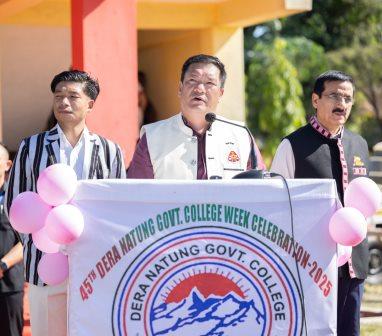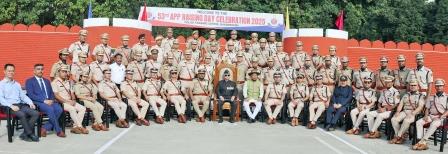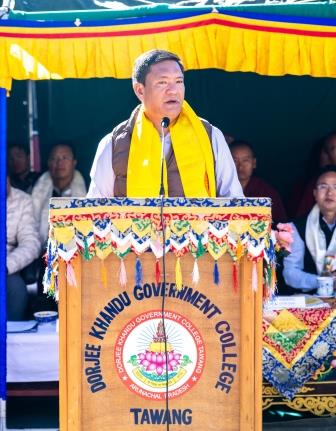-
Cadet death: East Siang Police arrests 3 Sainik School staffers
-
 CM lauds DNGC for contribution to higher education over 46…
CM lauds DNGC for contribution to higher education over 46…
-
 Sona stresses on holistic education to truly nurture future generations
Sona stresses on holistic education to truly nurture future generations
-
High school student found dead in school bathroom, no signs…
-
Young Birders’ Month celebrated in Ziro Valley
-
Trigonometry concludes 4th annual convention
-
Kamle, Capital shine as veterans rule the court at Rupa…
-
Basic disaster response training concludes
-
 Governor graces Arunachal Pradesh Police Raising Day
Governor graces Arunachal Pradesh Police Raising Day
-
 CM inaugurates new blocks of DK govt college
CM inaugurates new blocks of DK govt college
In what is being inferred as a positive step towards attainment of women equality and empowerment in the country, Supreme Court on Monday directed the government to grant Permanent Commission (PC) to all women army officers, including those in combat areas. In legal circles, the judgement has been hailed as historic, and rightly so, since among various institutional machineries functioning at the moment cutting across a broad range of professions, gender bias, whether openly or in covert manner, is a harsh reality. And now that it had been wiped out from an institution of high importance and reverence like Indian Army, efforts for a more fairer system that will make sure of a lesser or zero gender inequality will get a shot in the arm.
The ‘victory’ which has at last arrived wasn’t a cakewalk since it has been a prolonged legal battle starting from 2003 and subsequent Delhi HC’s judgement in 2010 ruling in favour of the demand for Women PC in Army which was somehow not implemented. It needs mentioning that permanent service in Army has been applicable only to men so far and women up till now were being inducted through a Short Service Commission (SSC) that allows them to work for 14 years only and PC had also remained restricted to the army’s legal and educational wings. But after this verdict which has technically paved way for grant of PC to all women army officers, including those in combat areas, there will now be same opportunities and benefits for women akin to their male colleagues which include ranks, promotions and pensions and most importantly, opportunities for serving longer tenures. The apex court has been categorical to term government’s argument of ‘physiological and social limitations of women’ as a “deeply entrenched… flawed notion” and of “gender stereotypes”. Along with this, government’s argument that male soldiers are not ready to accept orders from female officers was also squashed by the SC with scathing counter arguments. In a nutshell, the verdict has been viewed as path-breaking as it has tried to dismantle the long-nurtured preconceived notions surrounding the ‘limitations’ of women while serving the nation donning the army uniform. It will now be interesting to see whether this is new-found endorsement of women empowerment and equality have any spillover effect across various other fronts where there do exist discrimination in various degrees. The most glaring instance, even if it may sound an old harp is the still unfulfilled demand for a 33% reservation for women in the highest law making body of the country- the parliament.
A disturbing discrimination that had remained for long has been erased. And the biggest takeaway from the verdict perhaps is the inspiration to remove the remaining others.

Kenter Joya Riba
(Managing Editor)She is a graduate in Science with post graduation in Sociology from University of Pune. She has been in the media industry for nearly a decade. Before turning to print business, she has been associated with radio and television.
Email: kenterjoyaz@easternsentinel.in / editoreasternsentinel@gmail.com
Phone: 0360-2212313

